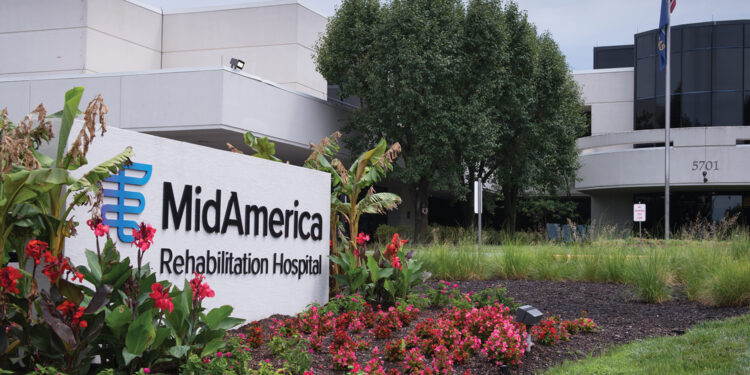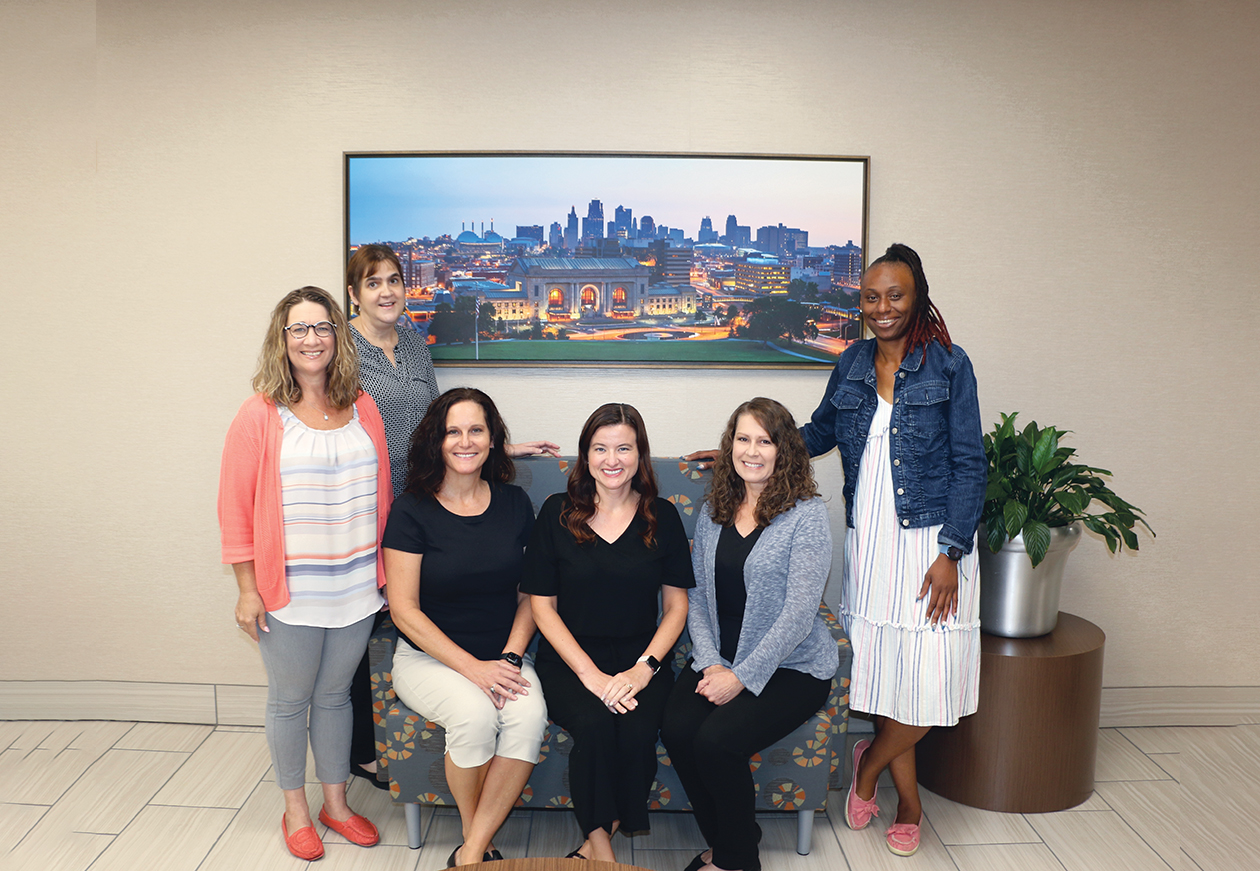A Navigational Compass for Rehabilitation

Story by Ann E. Butenas
Case Management is an integral part of the multidisciplinary approach the health care experts at MidAmerica Rehabilitation Hospital offer their patients.
Rehabilitation hospitals play a pivotal role in the healthcare continuum, providing intensive, multidisciplinary care to individuals recovering from serious illnesses, injuries, or surgeries. Within this intricate matrix of care, case management emerges as a cornerstone, ensuring seamless transitions, individualized care, and optimal outcomes for patients.
With National Case Management Week at the forefront for October, presented by the American Case Management Association, it is important to understand the influence case management has at a rehabilitation hospital such as MidAmerica Rehabilitation Hospital (MARH), part of the Encompass Health network, in Overland Park, Kansas. MARH is a leading provider of in-patient rehabilitation for stroke, brain injury, hip fractures, and other complex neurological and orthopedic conditions.
Sara Crow, MA CCC-SLP, CCM, Certified Director of Case Management at MARH, has successfully led her team of expert case managers for the past nine years. However, she has been with the hospital for nearly two decades.

Pictured: Sara Crow, Marlene Lira, Gina Drury, Aundrea Kleinhagen, Karyn Beth, Stanina Minor – Not Pictured: Jennifer Manka, Kathryn Lalli
“I had an opportunity to apply for this position and felt it was a good fit,” she recalled. “I love being involved in patient rehabilitation.” A speech therapist by profession, Crow now feels blessed to work in the best of both worlds. “This role allowed me to stay at a place I love and do what I enjoy.”
Patient-Centered Care
Case managers advocate for patients, ensuring that care plans are individualized, culturally sensitive, and in line with patient preferences and values. By understanding each patient’s unique situation and goals, case managers ensure that care is tailored to their specific needs and aspirations. This approach not only boosts patient satisfaction but also contributes to more meaningful and lasting health outcomes.
Crow indicated that case managers at Encompass Health/MARH are all licensed clinicians, including social workers and therapists. These individuals can do evaluations, get the care patients need, coordinate all aspects of that care, advocate for families, act as the go-between for nurses and doctors, and be the mouthpiece for the insurance companies, among many other duties.
“Case managers are constantly taking information from all sources to create a discharge plan,” Crow explained. “At MARH, we have enough time that we can do good work to get the proper equipment, ramps in the homes, caregivers in the home and more. In essence, we can provide an extremely high level of service.”
Efficient Resource Utilization
Hospitals and healthcare systems are often faced with the challenge of optimizing limited resources. Case managers have a broad understanding of both the clinical and administrative aspects of care, enabling them to allocate resources effectively. By ensuring that patients receive the right care at the right time, case managers help minimize wastage and improve the cost-effectiveness of rehabilitation services.
MARH boasts four full-time care managers who oversee 12-15 patients each.
“There is a lot of work they do to make sure they give patients what they need,” said Crow. “I learned early on there is a unique drive in our case managers, they work so hard to solve every problem for their patients. There is a fight and a fire within them. They do what it takes in a very empowering way to get patients and their families what they need and deserve.”
Family and Caregiver Support
Rehabilitation doesn’t just impact patients. It also affects their families and caregivers. Case managers are skilled in providing counseling, resources, and guidance to these individuals, ensuring they are equipped to support their loved ones. By doing so, they help foster a holistic healing environment both within and outside the hospital setting.
Crow went on to explain there are so many questions patients have, especially when a family is in crisis mode.
“The more we can do to answer their questions, the better,” she reflected. “Many of these patients are dealing with significant cognitive and physical deficits. Our job is to help families survive physically and emotionally, giving them peace of mind.”
Advocacy and Patient Rights
Patients in rehabilitation settings, especially those with cognitive or communicative impairments, may find it challenging to voice their concerns or understand their rights. Case managers act as steadfast advocates, ensuring that patients are treated fairly, that their rights are upheld, and that any grievances are promptly addressed.
Crow referred to her team of case managers as superheroes.
“They figure things out,” she asserted. “They do not like to set things down undone. They are dealing with humans in what may be the most traumatic moment in their lives. No one is at their best then. That is where we come in.”
Transition and Discharge Planning
One of the primary roles of case managers is overseeing the transition and discharge process. This involves liaising with community resources, arranging for outpatient services, and ensuring patients have the necessary support once they leave the hospital. Effective discharge planning reduces the risk of readmissions and ensures continuity of care, helping patients reintegrate into their communities successfully.
“We know what we deserve as human beings,” paused Crow. “It’s eye-opening to know what’s available. We are here to provide those resources to our patients.”
In the intricate dance of rehabilitation, case management stands out as a pivotal force, ensuring that care is individualized, coordinated, and efficient. It serves as the bridge between clinical expertise and patient experience, ensuring the journey to recovery is not just about regaining function but also about rebuilding lives. As healthcare continues to evolve, the role of case managers at MARH will undoubtedly grow in significance, offering a beacon of personalized care in an increasingly complex medical landscape.
 For more information on MidAmerica Rehabilitation Hospital contact them
For more information on MidAmerica Rehabilitation Hospital contact them
at 913-491-2400 or visit http://midamericarehabhospital.com






